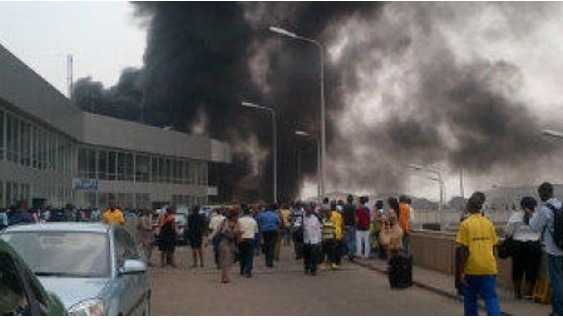AIB expresses dismay over failure to report serious incidents by Air Peace


Insists that all airlines must adhere to due process, as enshrined in ICAO Annexes
The Accident Investigation Bureau has expressed displeasure over what it described as “the persistent failure of some airlines to report accidents or serious incidents to the Bureau as mandated by Law.”
In a statement signed by the spokesperson, AIB, Tunji Oketunbi, the Bureau made reference to some serious incidents, which occurred at no-distant intervals, involving one of Nigeria’s burgeoning carrier, Air Peace, but were never reported.
It said: “On the 5th of June 2019, the Bureau received notification about a serious incident involving a Boeing 737-300 aircraft with Registration Marks 5N-BUK, belonging to Air Peace Limited from a passenger onboard.
It was reported that the said incident occurred on Wednesday, 15th May 2019, while the aircraft was on approach to Murtala Muhammed International Airport, Lagos from Port Harcourt. The aircraft was said to have experienced a hard landing as it touched down on the runway (18R).
Upon receipt of the notification, the Bureau visited Air Peace Limited office and confirmed the said occurrence. The Bureau further conducted a damage assessment on the aircraft, which revealed that the aircraft made contact on the runway with the starboard engine cowling as obvious from various scrapes, scratches, and dents, an evidence of tyre scouring on the sidewalls of the No. 4 tyre as well as bottoming of the main landing gear oleo struts. There was also visible damage to the right-hand engine compressor blades.
The aircraft has since been on the ground, awaiting implementation of the hard landing inspections recommended by the aircraft manufacturer, the Boeing Company. This includes an inspection of the right-hand engine pylons and the wing root, due to the heavy impact concerns.
Further discussions with the Maintenance Personnel of Air Peace Limited revealed that CFM International, the engine manufacturer, has also been contacted with regard to necessary inspections, to ascertain the serviceability of the starboard engine.
The nature of the damage suggests that there was a high probability of an accident as captured in the definition of Serious Incidents in the Bureau’s Civil Aviation (Investigation of Air Accidents and Incidents) Regulations 2016 viz:
‘An incident involving circumstances indicating that there was a high probability of an accident, and is associated with the operation of an aircraft …’
Of utmost concern is the fact that till date, the Accident Investigation Bureau has received no notification of the incident: three (3) weeks after the date of occurrence, contrary to ICAO Annex 13 which guides the operations of aircraft accident investigation procedures.
Rather, the Bureau further to the occurrence received a submission of a ‘Mandatory Occurrence Report’(MOR) subsequently filed at NCAA, on 7th June 2019, which filing was as a direct result of the Bureau’s visit to Air Peace office on the 6th day of June 2019.
A MOR is a Mandatory Occurrence Report that an Operator files after an occurrence to NCAA and not a Notification to the Bureau as required by its Regulations.
Similarly, and in recent times, an aircraft belonging to Air Peace Limited was also involved in a serious incident and the airline willfully failed to comply with the provisions of the Bureau’s Regulations which provides that:
‘Subject to paragraph (2) below and regulation 14 where an accident or a serious incident which results in the withdrawal from service of an aircraft occurs in or over Nigeria, no person, other than an authorised person, shall have access to the aircraft involved and neither the aircraft nor its contents shall, except under the authority of the Commissioner, be removed or otherwise interfered with.
Where it is necessary to move aircraft wreckage, mail or cargo, sketches, descriptive notes, and photographs shall be made if possible, of the original positions and condition of the wreckage and any significant impact marks.’
Precisely, on December 14th, 2018, a Boeing 737-300 belonging to the airline, with registration marks 5N-BUO, en route Akanu Ibiam International Airport, Enugu from Lagos was involved in a serious incident at about 10:44hrs. The information only got to the Bureau through social media.
Whilst the Bureau was not notified of the occurrence until later in the evening, AIB investigators met the aircraft at the General Aviation Terminal (GAT) apron in Lagos where it was parked with the Cockpit Voice Recorder (CVR) affected, thereby posing an undesirable difficulty in the Bureau’s bid to successfully discharge its statutory mandate of investigating accidents and serious incidents.
A careful investigation of the incident by the Bureau revealed that the aircraft was relocated from Enugu where the incident occurred, back to Lagos: and all relevant information on the CVR was overwritten, thereby making it impossible for the Bureau to retrieve the actual data.
The Accountable Manager and Chief Pilot of Air Peace Limited at the material time were duly warned by the Bureau for non-compliance with the Regulations.
Based on all the foregoing, it is obvious that Air Peace Management lacks the full understanding of the statutory mandates, functions, and procedures of the Bureau.
It is noteworthy that Air Accidents and Serious Incidents investigations are carried out in accordance with the relevant Laws and Regulations in force, in the interest of safety and with the aim of forestalling similar occurrences in the future.
Section 29 of the Civil Aviation Act 2006, which is the Act establishing the Bureau, confers the prerogative to determine the classification of an accident or serious incidents on the Accident Investigation Bureau, Nigeria. All Airlines are therefore enjoined to report these occurrences at all times.
The relevant statutory and regulatory provisions are reproduced hereunder for ease of reference:
Subsection 29 (11) (a) further provides;
‘… Without prejudice to the generality of subsection (10) of this section, the regulations made thereunder may, in particular, contain provisions:
(a) requiring notice to be given of any such accident or incident as aforesaid in such manner and by such persons, as may be prescribed…’
Furthermore, Section 10 of the Civil Aviation (Investigation of Air Accidents and Incidents) Regulations 2016 provides for Notification to the Bureau and Duty to furnish information relating to accidents or incidents as follows:
‘Where an accident or incident occurs in respect of which, by virtue of regulation 14(2), the Commissioner is required to carry out, or to cause an officer to carry out an investigation, the relevant person or any other person having knowledge of an accident or incident and in the case of an aerodrome accident or incident occurring on or adjacent to an aerodrome, the operator of the Airport shall forthwith give notice thereof, within twenty four hours, to the Bureau by the quickest means of communication available and in the case of an accident occurring in or over Nigeria, shall also notify forthwith a Police Officer of the area where the accident occurred …’
Section 10 (2) (a) also provides that the expression ‘Relevant Person’ means:
‘in the case of an accident or serious incident occurring in or over Nigeria or occurring elsewhere, to an aircraft registered in Nigeria, the Pilot-in-Command of the aircraft involved at the time of the accident or serious incident or, if he or she is fatally injured or incapacitated, the quality assurance,/safety personnel, Owner or Operator of the aircraft…’
It is also worthy of note that the Flight Data Recorder (FDR) and Cockpit Voice Recorder (CVR) data are very crucial, as the data accessed from them provide relevant evidence which sustains the weight of air safety investigation.
The provisions of ICAO Annex 6 (Operation of Aircraft) to the Convention of International Civil Aviation Organisation (ICAO), Section 11.6 (Flight Recorder Records) states:
‘To preserve flight recorder records, flight recorders shall be deactivated upon completion of flight time following an accident or incident. The flight recorders shall not be reactivated before their disposition as determined in accordance with annex 13.’
‘The operator shall ensure, to the extent possible, in the event the airplane becomes involved in an accident or incident, the preservation of all related flight recorder records and, if necessary, the associated flight recorders, and their retention in safe custody pending their disposition as determined in accordance with annex 13.'”
The Bureau reiterated that air accidents or serious incidents investigation is not for the purpose of apportioning blame or liability rather it is to uncover the causes of occurrence and to propose safety recommendations.
It also emphasised that the responsibilities for reporting, collection and exchange of safety data and investigating of safety occurrences are established by ICAO Annex 13 and amplified in the AIB Regulations.
It noted that it will do anything within its mandate and the confines of Law to investigate accidents and serious incidents and promptly issue safety recommendations to prevent reoccurrences.
“Consequently, all aviation service providers have a legal responsibility to report to the Accident Investigation Bureau on all accidents and or serious incidents of which they become aware; so are all Pilots, Airline Operators and the general public enjoined to do, in compliance with the Laws and Regulations as it relates to accidents and serious incidents investigation.
The SAFETY of the flying public is of primary importance and on the scale of significance, supersedes the commercial consideration of any airline,” said the Bureau.





